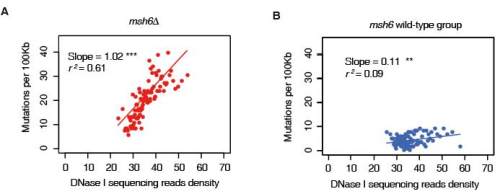DNA is replicated to pass genetic information to the daughter cells during cell proliferation. Replication errors, if not repaired, can lead to genetic mutations. For an individual organism, some DNA mutations may cause disease, even lethality. Robust DNA repair system exists in cells to ensure efficient correction of replication errors, to safeguard genetic fidelity. However, a small percentage of replication errors escapes from DNA repair, and provides an important basis for evolution. Epigenetics studies heritable phenotype changes that are not attributed to changes in DNA sequences. In fact, epigenetic systems can also directly impact DNA sequences.
On July 5, 2016, a research article entitled “Preferential Protection of Genetic Fidelity within Open Chromatin by the Mismatch Repair Machinery” was published online in the journal Journal of Biological Chemistry. In this study, using an experimental evolutionary approach, researchers from ZHU Bing’s group at the Institute of Biophysics of the Chinese Academy of Sciences analyzed rates of mutation in wild type and mismatch repair deficient strains of the fission yeast, Schizosaccharomyces pombe that had evolved for approximately 2,000 generations. They found that in wild type strain, mutation rate in heterochromatic region was much higher than that in euchromatin, and such discrepancy was diminished in a mismatch repair deficient strain. This indicates that the mismatch repair machinery preferentially protects genetic fidelity in euchromatin. Further analysis indicated that such selectivity is determined by the variability of chromatin accessibility at distinct chromatin regions. They also found that mutation rates were positively correlated with chromatin accessibility in S. pombe and human colorectal cancer samples with deficiencies in mismatch repair. And such positive correlation was not observed in S. pombe and human colorectal cancer samples with functional mismatch repair machinery. This study provides direct evidence for the impact of epigenetic system in genetic fidelity.
This work was supported by the Chinese Ministry of Science and Technology, the China National Science Foundation, the Strategic Priority Research Program of the Chinese Academy of Sciences, and the Howard Hughes Medical Institute International Early Career Scientist Program. SUN Lue and ZHANG Yan from ZHU Bing’s group are the co-first authors of this paper.

The relationship between mutation accumulation and chromatin accessibility in fission yeast strains with deficient (left) or functional (right) mismatch repair machinery. (Image by IBP)
Full text
Contact
ZHU Bing
National Laboratory of Biomacromolecules, IBP
E-mail:zhubing@ibp.ac.cn
Tel:86-10-64888832